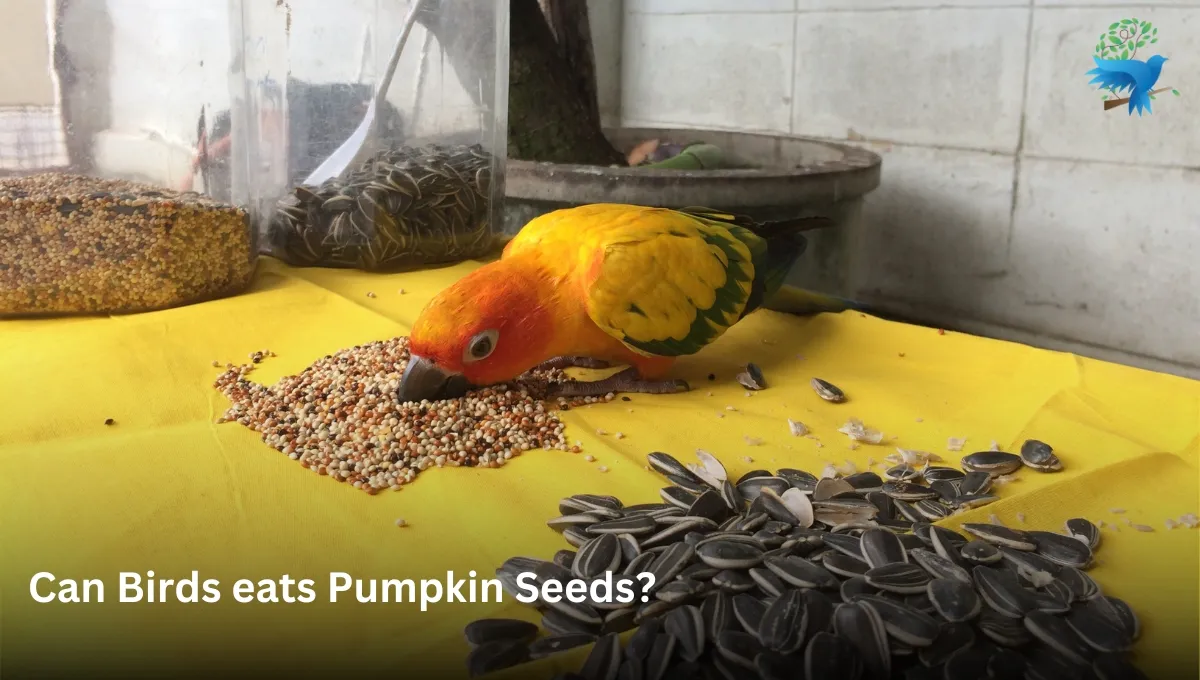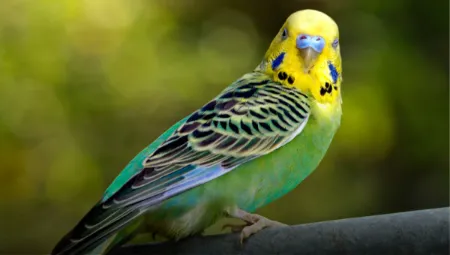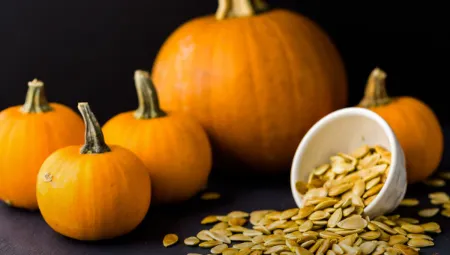Can Birds eats Pumpkin Seeds?

Bird lovers and caregivers frequently question the appropriateness of different foods for their pet birds. Among the multitude of edible choices, pumpkin seeds are notable for their nutritional richness and accessibility.

Questioning if birds can eat pumpkin seeds involves grasping their food preferences, nutritional advantages, and possible hazards. This article probes into the question,” Can Birds Eat Pumpkin Seeds,” to offer a thorough understanding of responsible bird feeding.
Nutritional Value of Pumpkin Seeds
Pumpkin seeds, also known as “pepitas”, are the edible seeds of a pumpkin or certain other cultivars of squash. These seeds are nutrient-rich, with a high content of healthy fats, protein, dietary fiber, and numerous micronutrients.
They are particularly rich in antioxidants, magnesium, and other nutrients that enhance heart and bone health. They also contain polyunsaturated fatty acids and antioxidants such as selenium and beta-carotene. These seeds are wholesome snacks for humans.
However, the question arises: Can birds reap the nutritional benefits of pumpkin seeds?
Even though birds have distinct dietary needs to be compared to humans, specific nutrients in pumpkin seeds, like protein and beneficial fats, can enhance their health. Adding these seeds to their diet can offer additional nutritional benefits when suitably provided.
Types of Birds That Can Consume Pumpkin Seeds
Many bird species show a preference for seeds in their diet. Some of the pet and wild birds that enjoy pumpkin seeds are:
- Pet Birds: Pumpkin seeds are favorite foods for pet birds, such as parrots, cockatiels, and budgies.
- Wild Birds: Wild birds like cardinals, blue jays, and sparrows can also love pumpkin seeds as part of their diet.
Among these birds, larger species such as parrots and pigeons may find it easier to crack and eat whole pumpkin seeds. On the other hand, smaller birds may favor crushed seeds or smaller pieces.
Preparation of Pumpkin Seeds for Birds
Pumpkin seeds are healthy and nutritious for birds. However, it is essential to prepare pumpkin seeds properly before feeding them to birds. So here are some ways to prepare pumpkin seed for bird feeding:
- Roasting: Roasting pumpkin seeds enhances their inherent taste, which birds greatly enjoy. However, it is crucial to avoid adding salt or other seasoning during the roasting process, as they could potentially cause health problems for the birds.
- Drying: Another method of preparing pumpkin seeds for birds is drying. This process helps to eliminate any moisture in the seeds, preventing the risk of fungal growth.
- Mixing with other feed: Birds enjoy a diverse diet, and incorporating dried or roasted pumpkin seeds with different bird seed blends or homemade bird snacks can enhance their dining experience with a delightful twist.
Risk and Considerations
Feeding pumpkin seeds to birds can offer nutritional benefits, but it is essential to be aware of potential risks associated with this practice:
- Choking Hazards: Whole pumpkin seeds can be a choking hazard, particularly for smaller birds. Birds may try to swallow seeds that are too large, leading to choking or digestive blockages.
- Toxicity from Mold or Spoilage: Mold can be developed on seeds that are damp or stored improperly, leading to toxins harmful to birds if ingested.
- Salt Content: Some commercially available pumpkin seeds may be salted, which can be harmful to birds. Excessive salt intake can lead to dehydration.
- High Fat Content: Pumpkin seeds should be fed in moderation due to their high-fat content, which can lead to health issues such as obesity if consumed excessively.
- Chemical Contaminants: Pumpkin seeds might be treated with pesticides or other chemicals harmful to birds. Ingesting such chemicals can result in poisoning or other health complications.
Following are the necessary precautions and considerations while feeding pumpkin seeds to birds:
- Quality Assurance: Ensure the seeds are fresh, clean, and free from mold, additives, or pesticides. Opt for organic, unsalted seeds to minimize potential risks.
- Size Adjustment: Consider breaking or grinding the seeds into smaller pieces for easier consumption, especially for smaller bird species.
- Moderation in Feeding: Offer pumpkin seeds as a part of a varied diet rather than the primary food source. A diverse diet helps maintain nutritional balance for birds.
- Proper Feeder Maintenance: Keep feeding stations clean and dry. Remove uneaten or spoiled seeds promptly to prevent mold growth and bacterial contamination.
- Monitor Birds for Allergic Reactions: It is crucial to observe the health of birds when feeding them pumpkin seeds, as some may exhibit allergic reactions. If any negative impacts are detected, it is advised to stop the feeding immediately.
By considering these risks and applying the necessary considerations, a birdwatcher or owner can responsibly offer pumpkin seeds to birds, providing a supplement treat while safeguarding their health and well-being.
Feeding Pumpkin Seeds to Birds: Best Practices
To optimally deed pumpkin seeds to birds, it is essential to include them as part of a well-rounded diet.

Combining them with other foods that are safe for birds, like fresh fruits, vegetables, and appropriate seeds, can provide a varied and healthy meal.
Monitoring the birds behavior after introducing pumpkin seeds can help their preference for the seeds and the impact on their health.
Other Bird-Friendly Seeds and Foods
Although pumpkin seeds are nutritionally beneficial, it is crucial to vary a bird’s diet for optimal health. Sunflower seeds, both in the shell and hulled, offer high protein and fat content, attracting a wide array of birds.
Also, Nyjer seeds are a favorite among finches due to their rich oil content. Millet, available in different colors, appeals to ground-feeding birds like a sparrow. Cracked corn entices species such as doves and quails.
Read More: Can Birds Consume Flax Seeds?>>>
Fruits like apples, berries, and oranges attract many birds with their natural sugar and nutrients. Mealworms and suet provide essential protein and fat, crucial during nesting and colder seasons.
By offering these diverse seeds, fruits, and supplementary foods, bird enthusiasts can cater to various species dietary preferences while supporting their overall health and vitality.
Conclusion
In conclusion, the query” Can Birds Eat Pumpkin Seeds?” is significant due to the potential nutritional advantages these seeds provide.
They are appropriate for numerous bird species, but careful preparation, moderation, and a varied diet are crucial when integrating pumpkin seeds into their diet.
Providing an assortment of different foods in addition to seeds can aid in attracting a diverse range of bird species. Comprehending the preferences and health needs of birds promotes a comprehensive approach to bird care and nutrition.
FAQs
Can all birds eat pumpkin seeds?
Yes, all birds can eat pumpkin seeds. They are safe and provide a good source of nutrients such as protein, fiber, and various minerals.
How should pumpkin seeds be offered to birds?
Pumpkin seeds can be offered to birds in a few ways. They can be scattered on the ground or placed in open-topped bird feeders. For smaller birds, you might consider grinding the seeds coarsely in a food processor before feeding. Regardless of the method, ensure the seeds are raw and not treated with any additives like salt or sugar.
What types of birds eat pumpkin seeds?
Many types of birds enjoy pumpkin seeds including finches, jays, nuthatches, woodpeckers, and more.
What are the benefits of eating pumpkin seeds for birds?
The following are the benefits of eating pumpkin seeds for birds:
- Improves Feather Health
- Enhanced Immune System
- Increased Energy level
- Aid in Digestion






